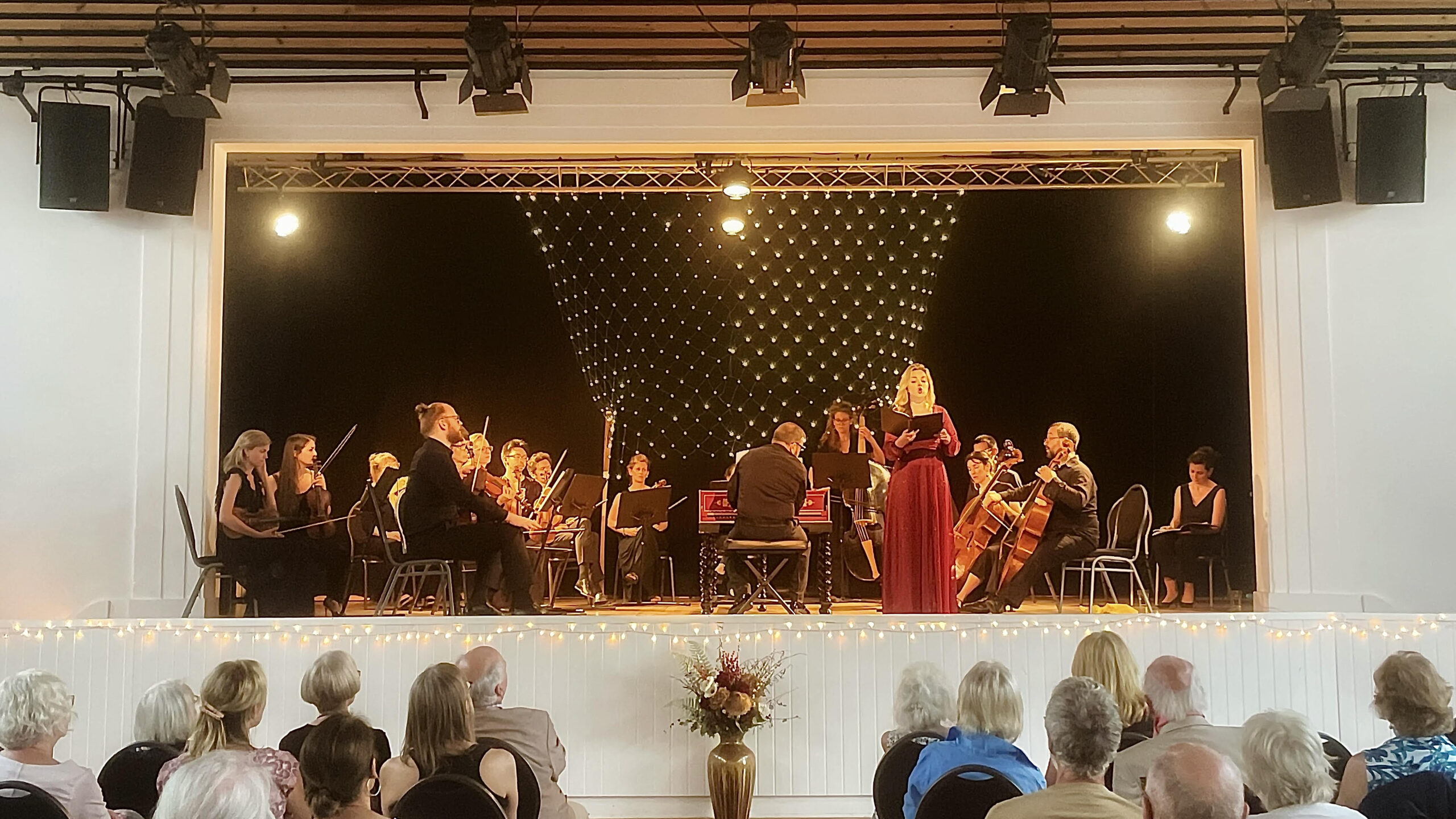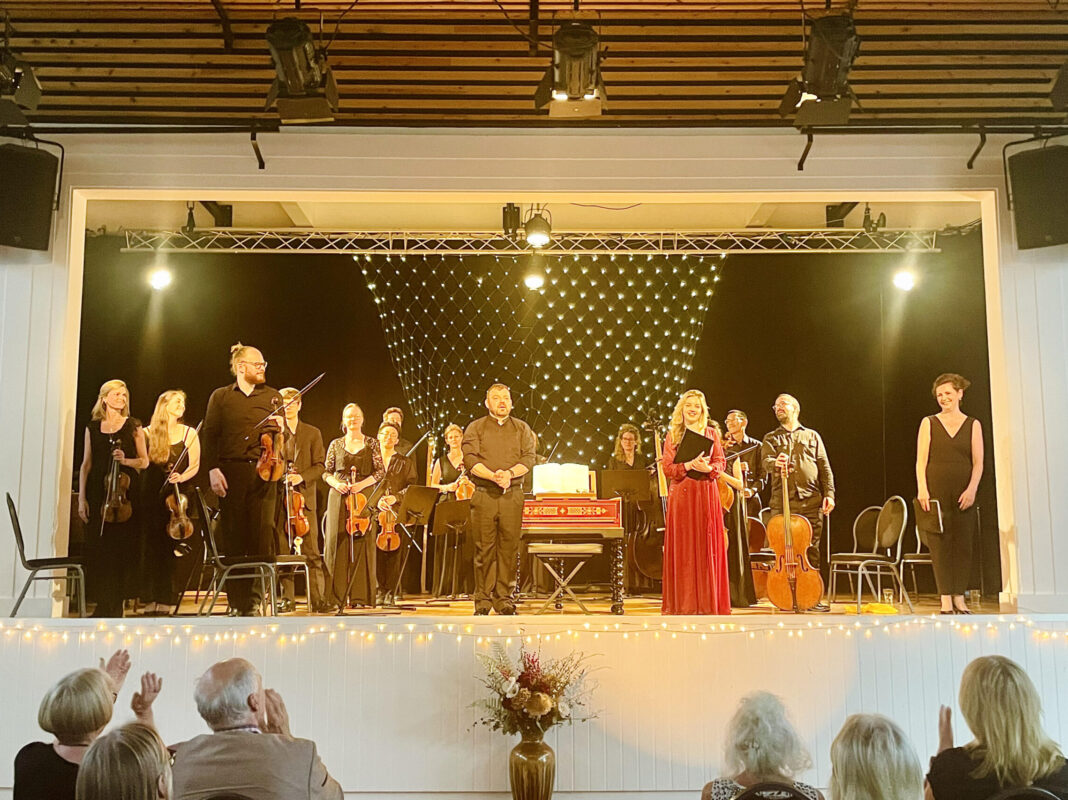If you weren’t at the creative centre tonight, I’m not sure there are enough superlatives to describe just how good this concert was. When the best baroque musicians in the UK are in town, everyone should have been fighting for a ticket. This was the last, and yes, the best was saved until last, of the Bridgepoint music series.
Steven Devine conducted a group of musicians who regularly appear with the Gabrielli Consort, the Orchestra of the Age of Enlightenment and many other leading baroque ensembles. Cellist Christopher Suckling, is head of historic performance at the Guildhall School of Music, violinist Matthew Trustcott is a leader of the OAE, violist John Crockatt of the Academy of Ancient Music, and the list goes on. These are superb musicians in the field of early music and to get them together in Rye, on a Saturday night is quite an achievement, well done Tom Elliott, manager of Bridgepoint Music, for pulling this off.
The evening started with music by Lully, composer to Louis XIV, who naturalised as a French citizen in 1661 and wrote a number of ballets and operas. After hearing the overture to his Alceste, which was, of course, played with impeccable precision and musicianship, we heard three of his dances. These short pieces beautifully contrasted each other in timbre and key, and it was a delight to hear these rarely performed works.
Lully died just two years after the birth of JS Bach, and it was the latter’s Brandenburg Concerto No 3 that we heard next. Setting off at a sensible speed it is always a joy to see the music bounce from violin to viola to cello; each instrument picking up the thread of the last and making it their own. Because this work has no middle movement, apart from two bars that Bach wrote, we heard a realisation of what the middle movement could have sounded like, by Brian Clarke, who wrote it as an academic study. The audience very much appreciated this. Again, we didn’t go at show-off speed as some bands do, with the last movement and the clarity of each line was easily heard. There is a notorious intricate and exposed passage for the first viola here, and it was lovely to see the little smile between the three viola players when Mr Crockatt finished it. But stand out for me was Rosie Moon, double bass player. She is the music, she is the instrument, she is so attentive to every note and looked like she enjoyed every one of them.
I managed to have a quick chat with Mr Devine in the interval. Harpsichordist and director of the OAE, he has worked around the world and made numerous recordings, including Dido and Aneas with the OAE and my hero Sarah Connolly. I know that he is much loved and respected by all musicians who work with him – I texted a couple of my mates who have performed with him after the gig and they all said he was great!; he is a very nice, down to earth chap. So down to earth in fact he even packs his harpsichord into the back of his estate car after the gig!
What was truly stunning about this concert was the fact that the soprano due to sing the role of the shepherd in Handel’s Aminta e Fillide went down with laryngitis (the scourge of singers) on Thursday evening. She was replaced by Aoife Miskelly, who has a very versatile repertoire and is a Handel specialist, however, she had never heard of this role before 5pm on Thursday and learnt it in 24 hours! This is quite remarkable because Aminta e Fillide is not easy Handel; in fact some of it is quite fiendish. As she said, every now and again he throws you a curve ball. Aoife is managed by Rye’s own James Black management.
This little opera for strings and two sopranos was written in 1708, and one can hear that Handel recycled several of the arias here into his later operas. It is the story of Aminta, a shepherd, who is in love with the nymph Fillide, who is not interested. There follows a series of arias for each singer until Fillide succumbs to Aminta’s charms.
The delightful Rowan Pierce sang Fillide. She has performed at the Proms twice and is due there again this season. She has worked with all the top musicians around the world and made a number of recordings. She was also the ‘voice’ of Siena Rosso in Netflix’s Bridgerton. You can see why she is in such demand. Her clarity of diction is impeccable. At the top of her range her voice is bell like, crystal clear, and she has great artistry. In her first aria she made use of delightful ornamentation in her da capo aria. Miss Pierce has superb breath control, as evident in her second aria. She also has great character in her face, and also her voice; Handel plays the singer against the orchestra, mirroring and calling each other. In her third aria she wins round Aminta. We hear a softer side to Miss Pierce’s voice here and her voice simply melts into the accompaniment every time she comes in with a phrase. There was some quite impish playing in her fourth aria, with sudden stops in the music. The orchestra’s eyes were on the conductor hawkishly, and the timing was impeccable.
Aoife Miskelly has been a Kathleen Ferrier and Wigmore Hall song finalist, and has worked with the Irish, and Welsh National Operas. She has a diverse repertoire of operas to her name, as well as oratorios. She is much in demand around the world with leading orchestras. Again she has stunning clarity of diction. She has a wide-ranging voice, with a lush mezzo quality alongside crystal top notes. She is perfect for Handel, knowing when to sing it straight and when to add just enough vibrato to give the voice that human dimension.

Miss Miskelly’s second aria is high in tessitura, and there is real power in her voice. This aria has a beautiful continuo accompaniment, which is really a duet with the cello, as they mimic each other in the ensuing passages of music. There is real tenderness in her voice in the recits, which oozes into her third aria in a minor key and lilting 6/8 time. After winning the heart of Fillide, the fourth aria blends a duet between first and second violins, against some typical Handel runs in the voice – I say typical because there is always one that doesn’t follow the pattern and catches you out. There were some stunning colours in Miss Miskelly’s voice, and a full range of dynamics.
Sadly, there is only one duet in this work, right at the end. The voices complement each other so well. Whilst one sings a sustained line, the other sings more words than I’ve ever heard in a Handel aria; then they swap over. For Miss Miskelly to have learnt this note perfect so quickly shows what a gifted musician she is – this is far from easy music. Miss Pierce has a very characterful face and plays it so well in this last piece with suggestive looks between shepherd and nymph.
What was a delight to see was the joy on the faces of the musicians. This music is their lifeblood and they are world-class at it. It was a well-balanced and considered programme – much of the Handel was very dance-like, reminiscent of the Lully, and the interplay between instruments and voice in the opera was like the Brandenburg.
More please next season. And if these guys come back to Rye, do anything (legal) to get a ticket!
Image Credits: Martin Geldart .



